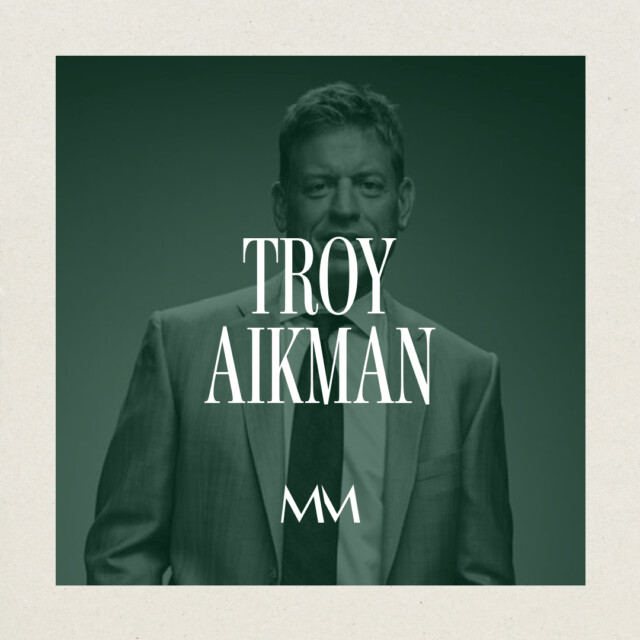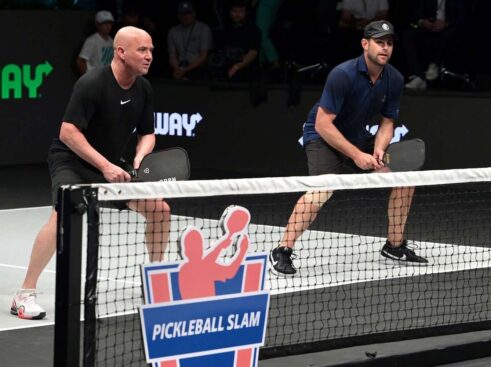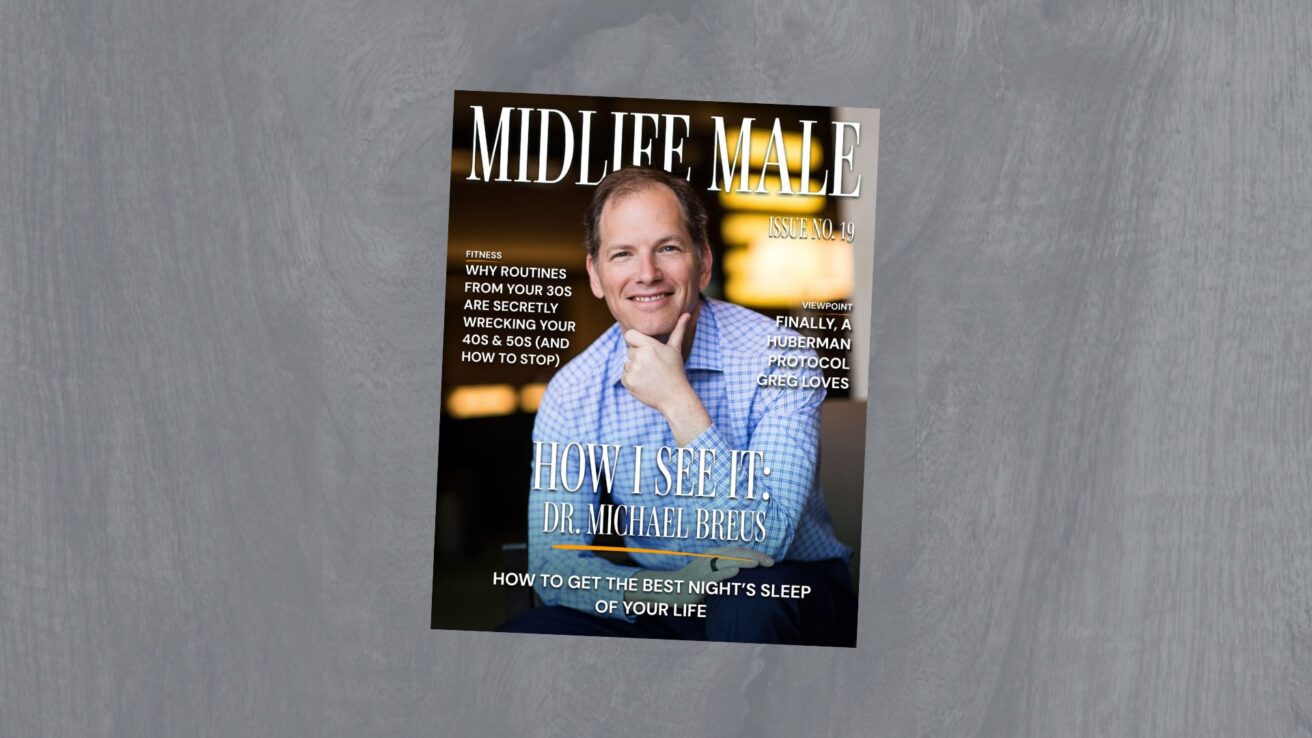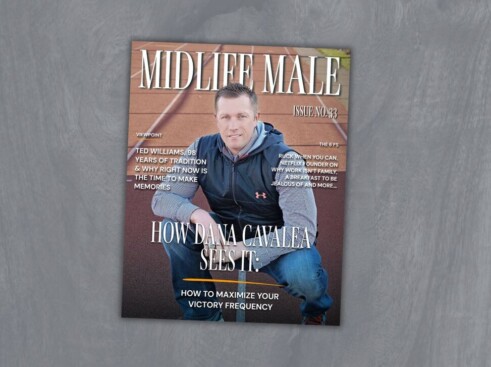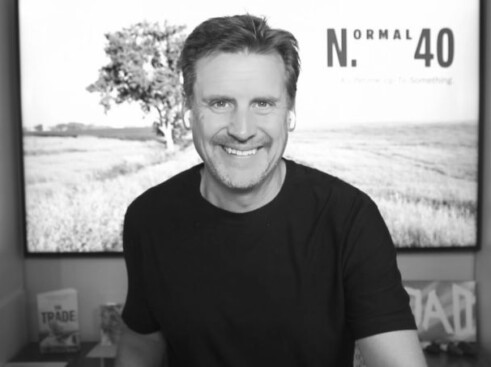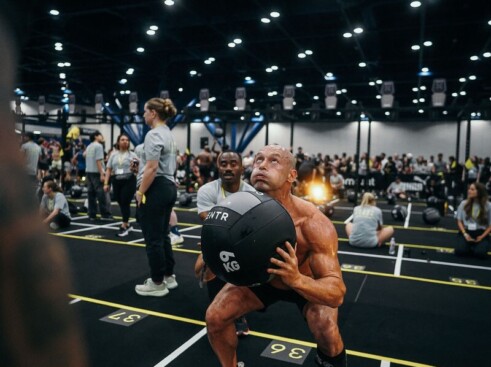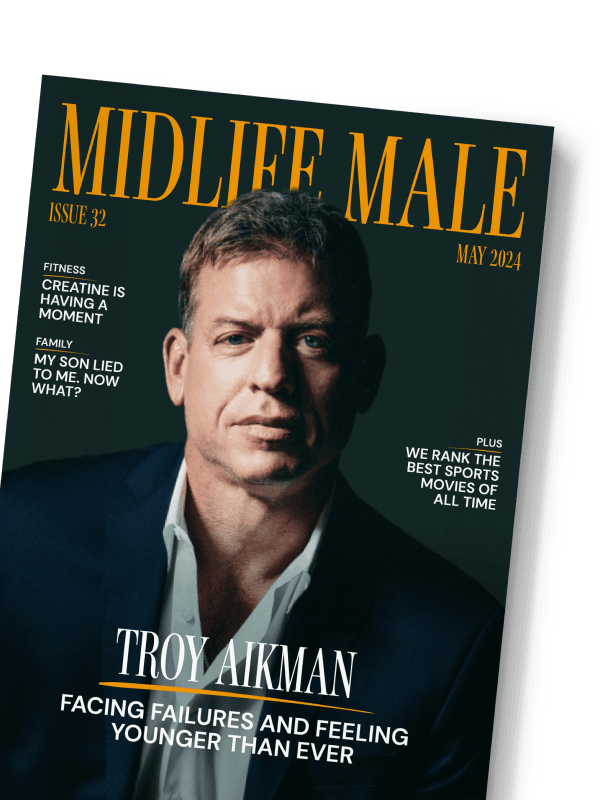Morning, Greg here! Welcome to Issue No. 19 of Midlife Male, the lifestyle magazine for midlife men, by midlife men. I wanted to personally welcome all our new readers, and if this newsletter was forwarded to you, subscribe below.
Also, if you received last week’s issue, I hope you took the time to read this piece, The Cold, Hard Reality Behind 35x Investing Returns, by our friend & expert, Ron Speaker, a Wall Street veteran for nearly 40 years and one of the smartest and most genuine guys I know. For all of us looking to amass wealth as we navigate midlife, this feature shares unique insight on asset values, liquidity, bull markets and more. Don’t skip this one (that’s why we’re giving it to you again…).

How I See It With Dr. Michael Breus

This year has been filled with challenges, injuries, and growing responsibilities for me. Like everyone else, I have the same 24 hours in a day, and how I choose to use them is critical. Prioritizing what’s important—dialing up certain areas while dialing back others—is essential for sustainability, longevity, optimization, and, ultimately, health and happiness.
One area I know I need to improve is sleep: its quality, consistency, and my overall approach.
I’ve realized I have a mental roadblock when it comes to overtraining, even when I’m exhausted. I’ll push through anyway—waking up early to train, working late, or bringing my phone to bed. My mind races, I get distracted, and I’ll wake up in the middle of the night, unable to fall back asleep. I’ll check my phone, look at my Whoop, and feel disappointed at my lack of recovery. Ironically, stressing about better sleep makes it even harder to achieve. It’s a vicious cycle, and truthfully, I’ve allowed too many things to interfere with proper sleep and recovery.
My wife Kate’s recent message to me before an interview hit home: “You need to get a sleep study and ask about sleep apnea. You snore sometimes, and it sounds like you’re choking—it wakes me up.”
For the record, I’m fortunate that I don’t think I snore much or have sleep apnea. Still, I’ll get the study done and report back. Sleep apnea is no joke. It’s estimated that 10–20% of men between 40 and 60 have it, with the risk increasing as they age. That’s a significant percentage.
On a recent guys’ trip, I roomed with one of my closest friends, who literally sounded like he was dying in his sleep. I was up all night worrying I’d need to resuscitate him or call an ambulance. The next morning, I told him, “As your friend and brother, you need to get that checked out.” It was serious enough to be scary—and a little funny. He spent the next few nights on the couch, and I imagine he’s struck similar deals with his wife. Apparently, he’s getting a mouthguard soon. Hopefully, he follows through.
I digress.
Last month, I met Dr. Michael Braus at the Eudemonia Summit in West Palm Beach, where he delivered an incredible speech and participated in a panel. The next morning, I had breakfast with him and Dr. David Rabin, founder of Apollo Neuro (which I wear). Dr. Rabin is an expert in optimization, wellness, longevity, and psychiatry.
After interviewing Dr. Rabin the day before, I connected with Dr. Braus over shared experiences as middle-aged men navigating health and wellness. We had a candid discussion about our priorities, relationships, and perspectives on life. It was a refreshing conversation that instantly clicked, laying the groundwork for future collaboration.
This week, Dr. Braus is featured in our “How I See It” interview. Later this year, he’ll join our Inner Circle for an in-depth discussion, where he’ll answer questions and share his insights. While his expertise spans many areas, we’re focusing on sleep here. One of his key takeaways: Don’t put too much pressure on yourself to be perfect. Over-fixating can be counterproductive to achieving your goals.
Don’t sleep on this interview.
In Health,
Greg
How I See It with Dr. Michael Breus
MLM: How old are your kids?
Michael Breus: My son is 22, and my daughter is 21.
MLM: Oh, we’re in the same boat! My oldest is 21, and my youngest is 18. Are yours out of school yet?
Michael Breus: My son just graduated and is living at home while job hunting. Let’s just say it’s been… challenging for all of us. My daughter, on the other hand, is a senior at UVA, speaks fluent Mandarin, and has already lined up a private equity job in Northern California.
MLM: That’s impressive!
Michael Breus: She’s driven, for sure. My son is the creative one—musician, actor—but it’s tough for him to figure out his next steps.
MLM: I get that. My oldest is studying finance at the University of Colorado, and my youngest is into graphic design. He’s 18 and already running his own budding business.
Michael Breus: That’s incredible! Is he planning to go to college?
MLM: He wants to, but the process has been very different from my older son’s. He’s creative and hands-on, so the traditional path doesn’t feel like the best fit. It’s made me rethink what’s necessary when it comes to college.
Michael Breus: Totally. College isn’t for everyone, and trade schools or alternative paths can be just as valuable. Plumbers, electricians—these are lucrative fields.
MLM: Absolutely. There was a Wall Street Journal article recently about that—nobody’s entering those trades anymore, but they’re rolling in money now. It’s just a different mindset, especially for those of us raised in traditional Jewish households. For us, it was always about following a hyper-defined path—doctor, lawyer, accountant. Straying from that was almost unthinkable.
Michael Breus: Same here. I grew up in a Jewish community in Sandy Springs, Georgia, where everyone followed the same path. It’s generational—people still live in the same neighborhoods, join the same clubs, and do what their parents and grandparents did.
MLM: Exactly. But it’s important to challenge that mindset, especially with kids who don’t fit the traditional mold. It’s been a challenge for this generation. They’ve had to navigate a world we never did, and it’s hard to give them tools when we’re figuring it out ourselves.
Michael Breus: You know, I think guys are always curious about how other guys are navigating this stage of life—balancing work, kids, and everything else. I think men are overwhelmed by the sheer number of options for personal development or communities these days. How do you know what’s right for you?
MLM: That’s a big issue. Some groups are co-ed, others are hardcore—like Navy SEAL-style boot camps. Some are more about emotional vulnerability, sitting in circles and passing a talking stick. Guys are gun-shy because they don’t know where to start.
Michael Breus: That’s where credible recommendations matter. If someone you trust points you to a group, a book, or even a podcast, you’re more likely to give it a shot.
MLM: Exactly. We want advice from someone relatable and aspirational. Like your sleep advice—when it comes from you, it’s trustworthy. Speaking of which, what do you think about grounding sheets?

Finally, a Huberman Protocol I WILL Follow

I’ve been vocal about this: you do NOT need to listen to Andrew Huberman for 3+ hours a day, 5 days a week. I am convinced 99% of the population doesn’t need that. It’s majoring in the minors.
Now, don’t get me wrong. There’s tremendous value in Huberman’s work. But what I want—and what would benefit 99% of middle-aged men out there—is straightforward, actionable advice. Just give me the three to five things I can do that will have the greatest impact on my life without disrupting everything else.
That’s prioritization. That’s total life wellness. That’s low-friction living. It’s about finding balance without falling into the over-indexing trap that so many of us (myself included) have been guilty of over the years. What you realize is that over-indexing isn’t sustainable, and it often hurts more than it helps.
On the flip side, you can also get so overwhelmed by the sheer amount of information and science out there that you freeze. You end up with paralysis by analysis. You’re afraid to start because it all feels too complicated. And that’s the biggest problem of all.
That said, I’m about to start following the fitness protocol Andrew Huberman recommends. Yes, I did the work for you. Actually, he did the work, broke it down into one slide, and I ran with it. Now I’m paying it forward by sharing it with you.

Millions of stories are posted online every day and 99.9% are noise. We sifted through the nonsense to find experts and thought leaders who will share deep dives in one of our 6Fs every week: Fitness. Family. Finance. Food. Fashion. Fun. These are powerful essays by our team or guest writers designed to make you think, grow and maximize your midlife starting now.
FITNESS
Why Routines From Your 30s Are Secretly Wrecking Your 40s & 50s (And How to Stop)
By Jon Finkel
“Just because something works, doesn’t mean it’ll work forever.”
This feels like a famous quote from a famous thinker, but it isn’t. I can’t find its origins anywhere and maybe it’s close to a movie line I can’t quite remember so if it is, hit us up and let us know. Until then, let’s just roll with it because it’s true and it speaks to an increasingly common issue I’ve talked about with friends around our age – and that’s the idea that after 40 we have to actively assess why we do what we do.
In particular, how we structure our days.
When was the last time you sat down and really thought about your day?
Why do you wake up at the time you do? Why do you workout when you do? When did you decide what your average bedtime would be?
When you really think about it, you’re likely to stumble on this fact: you never actually think about it – or at least you haven’t in a long time. Also, the answer to many of these questions is uncomfortable.
Why?
Because most likely you didn’t decide any of them, they just sorta happened as you played life defense as a midlife male.
What’s life defense?
Life defense is when your day-to-day schedule is structured around the onslaught of obligations that come your way during a given day as a dad, boss, husband, etc… That’s life.
The defense is how you slot your priorities in around these things.
When you’re a young, single guy, you build your life on offense: “This is what I want to do and when I want to do it. Done.”
Then, as you get into your 30s and you’ve got a wife, kids, more responsibilities at work, you build your day on defense: “There are some things I don’t have time for anymore and here is where I can do the things that matter most to me.”
Rarely, if ever, do these two schedules look anything alike. Ha!
And so you adapt and adopt.
For me, exercise has always been a priority and once I had kids in my early 30s, I realized that just about the only way I could make sure I got in an hour of uninterrupted exercise, where I didn’t feel rushed, where someone wasn’t waiting for me, where work or the kid’s activities wouldn’t mess it up, was if I woke up super early to workout.
I tried lifting at lunch, but it was a disaster. There was always a last minute call or a conversation someone had to have or worse, a meeting moved back or added to the day, which left me all jacked up on pre-workout, having to sit still in some conference room I didn’t want to be in with nowhere to go – not a recipe for success.
Post-work lifting sessions weren’t gonna happen because of my commute and because of the kids’ daycare and after dinner workouts didn’t fit because I wanted to spend time with my wife and kids.
So that left early mornings.
Up at 5:15AM and in the garage gym (which I built for this purpose over time) from 5:30AM to 6:30AM.
In the beginning, I hated it.
But once my body adjusted, I loved it.
And so I woke up at 5:15AM to exercise 4-5 days of the week for over a decade. For a while I’d even get up at 4:45AM to join the local Masters Swim Team for practices one or two days a week. Early mornings became my thing.
It was uninterrupted. It was my time. It was glorious. All I needed was a cup of coffee or energy drink around 11AM and I’d be fine the rest of the day.
Then, recently, after I turned 45, it became a struggle.
Slowly, at first, then day-to-day.


Listen to the audio book of Midlife Male, read by author/founder Greg Scheinman, on Audible today!
For more midlife content in your feeds, follow our new Midlife Male channels on Instagram, YouTube, and Threads.
***
